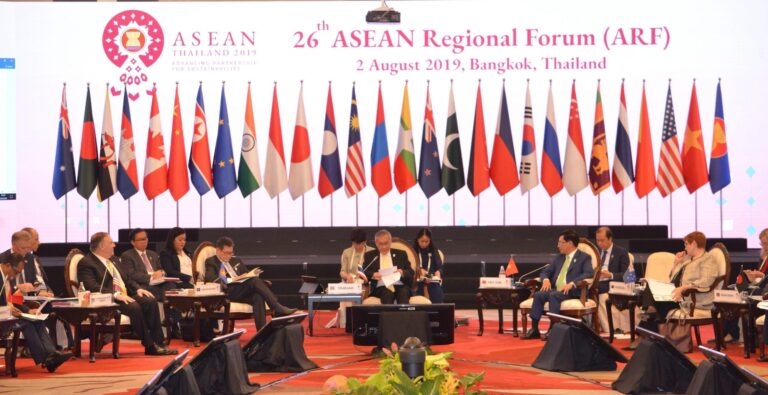The 32nd ASEAN Regional Forum (ARF) convened this year, reaffirming its role as a critical platform for dialogue and cooperation on security issues in the Asia-Pacific region. Hosted under the auspices of the Ministry of Foreign Affairs of Japan, the forum brought together foreign ministers and senior officials from member states to address pressing regional challenges, enhance mutual trust, and promote peace and stability. With a growing focus on strategic partnerships and multilateral collaboration, the 32nd ARF underscored the importance of collective efforts in navigating a complex geopolitical landscape.
Overview of Key Discussions at the 32nd ASEAN Regional Forum
The 32nd ASEAN Regional Forum brought together key stakeholders from across the Asia-Pacific to engage in robust dialogue on regional security and cooperation. Among the primary topics addressed, participants emphasized the need to enhance multilateral efforts tackling emerging challenges such as cybersecurity threats, maritime security, and pandemic preparedness. The forum reinforced ASEAN’s commitment to fostering peace and stability through collaborative frameworks that adapt to evolving geopolitical dynamics.
Discussions highlighted several priority areas aimed at deepening mutual trust and operational partnerships:
- Strengthening coordinated response mechanisms for non-traditional security threats
- Enhancement of maritime domain awareness initiatives
- Expanding dialogue on climate change impact and disaster risk reduction
- Promotion of inclusive economic recovery efforts post-pandemic
| Discussion Theme | Key Outcomes |
|---|---|
| Cybersecurity | Consensus on information-sharing protocols |
| Maritime Security | Joint patrols and confidence-building measures planned |
| Climate Action | Commitment to bolster disaster resilience |
Analyzing Diplomatic Strategies and Security Collaborations
Throughout the forum, participating nations highlighted the importance of cohesive diplomatic approaches in addressing complex regional security challenges. Emphasis was placed on leveraging multilateral dialogue mechanisms to build trust and transparency among ASEAN member states and their partners. Key strategic priorities included counter-terrorism cooperation, maritime security enhancement, and capacity building in cyber defense. Delegates underscored that sustained communication and regular joint exercises are critical to fostering resilience against emerging threats.
Several collaborative initiatives were proposed to fortify regional stability, such as:
- Information Sharing Networks: Establishing real-time intelligence exchanges across borders to preempt security risks.
- Joint Training Programs: Enhancing interoperability of armed forces through combined drills focused on humanitarian assistance and disaster relief.
- Legal Frameworks: Harmonizing maritime laws to curb illegal fishing and transnational crime.
| Security Sector | Proposed Collaboration | Expected Outcome | |
|---|---|---|---|
| Maritime Security | Joint Patrols and Surveillance | Reduced Piracy and Smuggling | |
| Cybersecurity | Cross-border Cyber Incident Response | Minimized Cyber Threats | |
| Counter-terrorism | Counter-terrorism | Enhanced Intelligence Sharing and Joint Operations | Disrupted Terror Networks and Increased Regional Safety |
Recommendations for Strengthening Regional Cooperation and Stability
Enhancing trust and transparency among member states emerges as a key priority to fortify regional peace. Strengthening communication channels through regular dialogue platforms and joint crisis simulation exercises could significantly reduce misunderstandings and promote timely conflict resolution. Additionally, expanding cooperative frameworks to address transboundary challenges such as maritime security, cyber threats, and disaster response will be critical in adapting to evolving regional dynamics.
Promoting inclusive multilateral engagement further supports sustained stability. This includes fostering partnerships with non-ASEAN actors, international organizations, and civil society to cultivate shared responsibility. Initiatives such as:
- Capacity-building programs targeting border management and counter-terrorism
- Information-sharing mechanisms to combat human trafficking and illegal trade
- Joint research and innovation hubs focusing on climate resilience
will not only reinforce regional resilience but also empower ASEANForum members to spearhead a unified and proactive approach to common threats.
| Focus Area | Proposed Action | Expected Outcome |
|---|---|---|
| Maritime Security | Joint patrol missions and intelligence-sharing | Reduced territorial disputes and piracy incidents |
| Cybersecurity | Regional cyber incident response team | Faster mitigation of cyber threats |
| Disaster Management | Cross-border emergency drills | Improved readiness and resource mobilization |
Closing Remarks
In conclusion, the 32nd ASEAN Regional Forum marked a significant step forward in strengthening regional security and cooperation among member states. Hosted by Japan and detailed on mofa.go.jp, the meeting underscored shared commitments to dialogue, confidence-building measures, and addressing emerging challenges such as cybersecurity and maritime security. As the ARF continues to evolve, it remains a vital platform for fostering peace and stability in the Asia-Pacific region, reflecting the collective efforts of its participants to navigate a complex geopolitical landscape.




